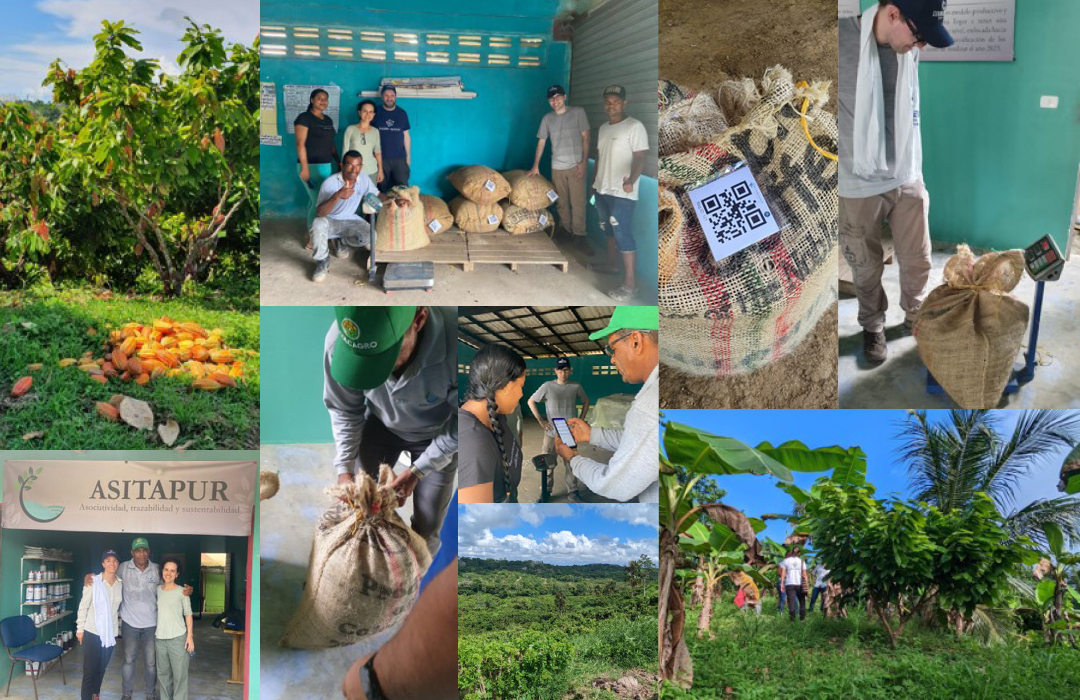
Smallholders can now access global markets directly, thanks to an innovative service which leverages the power of space to enable agricultural supply chains to be more ethical, sustainable and auditable. ORCAS (ORbital Commodity Asset Securitisation), developed under ESA’s Business Applications and Space Solutions (BASS) Programme by UK-based company Trade in Space (TIS) and supported by the UK Space Agency, already has four of the ‘top 20’ global coffee trading organisations using their services.
Working with stakeholders across the whole supply chain, including farmers, wholesalers and suppliers, ORCAS has the capacity to track individual sacks of cocoa, coffee or other commodities from the farm right through to the supermarket shelf.
When the EU and UK proposed strict new import legislation requiring importers to demonstrate traceability and sustainable production methods, many companies faced a huge challenge. Coffee and cacao producers, importers and exporters would not only be legally required to trace all regulated agriculture commodities back to the point of origin, but must also demonstrate that those origins have remained deforestation-free since 2020. TIS engaged with potential users and found that compliance with EUDR (European Union Deforestation Regulation), and similar forthcoming regulations required urgent innovative solutions.

TIS worked with CNCh, Colombia’s largest cacao company, throughout the pilot project and selected the region of Necoclí, Urabá to trial ORCAS. CNCh operates a large plantation in the region along with other external suppliers. The ability to trace all products through the supply chain and future-proof around compliance for legislation and export/import standards was complicated by the remote locations of farms and associations, with low to no internet access.
TIS focused on providing EUDR compliance for first mile supply chain operations, using blockchain and geospatial data for micro-lot transparency. Working with one cocoa association and eighteen of its member farmers, the pilot led to the development of two services: Sustainimaps for analysis and visualisation, and Digitrak for ground-sourced data.
The remoteness of farms, without access to 3G or Wi Fi, and the unreliable connectivity at co-operative buildings, meant secure offline collection and data storage was paramount. This was solved by using GNSS (Global Navigation Satellite Systems) chipsets within Android Operating systems and creating a lightweight, simple to use mobile app, Digitrak, for farmers to record information, with location data provided by the phone’s internal navigation system. Using a QR code system, individual sacks of cacao can be tracked from the farm gate to the association where the volume provided by each farmer was recorded. Once ready to ship to the wholesaler, Digitrak records the movement and bills for the shipment. As soon as connectivity is available, the data is “pushed” from Digitrak to Sustainimaps.
Sustainimaps is the second service system developed as part of the ORCAS project. Using the data collected from Digitrak, the system provides a visual traceability map for each shipment across the whole supply chain.
ORCAS combines satellite Earth observation data with datasets from a range of other sources, including the users themselves. GNSS provides pinpoint accuracy locations of farms within the supply chain. This in turn supports in-depth on-farm analysis, driven by satellite imagery, which can be used to verify crop existence and assess critical factors such as forest loss, relative humidity and temperature – indicators which are vital for predicting the risk of pest infestation and disease, increasing efficiency and crop security.
Guillaume Taun Prigent, ESA’s Technical Officer on this project, said “We are delighted to have supported this important project, which not only allows small producers to access important global markets, but also helps to support sustainable and ethical global supply chains.”
Robin Sampson, TIS Company founder, said “The ORCAS project which we completed through the ESA BASS Programme had a transformative effect on our company our assumed business models were robustly challenged, and undoubtably strengthened by the programme, and when we completed the programme we had two fully functioning products and a long list of new customers and users. Since completing the project, our commercial orderbook has continued to grow and we’ve now helped over 1 million farms worldwide to evidence that they meet emerging environmental regulations.”
With more than 1,000,000 family incomes protected by the ORCAS project to date, in November Trade in Space was awarded the ESA BASS Impact Award at the BASS conference. The success of the ORCAS pilot study in Colombia has already led to the development of further partner selling opportunities. Working with other potential customers, TIS plan to evolve the product in response to market demand for versions verifying imported beef into the EU and ensuring traceability in soy, natural rubber and palm oil supply chains.
Sign up for our Bioeconomy Bulletin


